KIA CEED 2015 Owner's Manual
Manufacturer: KIA, Model Year: 2015, Model line: CEED, Model: KIA CEED 2015Pages: 1210, PDF Size: 35.92 MB
Page 21 of 1210
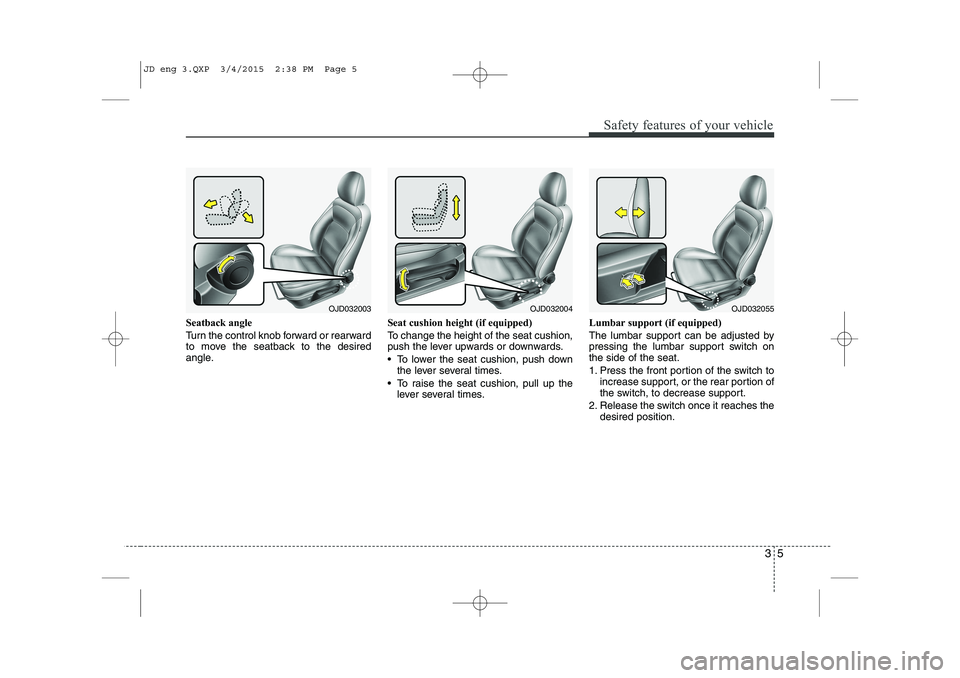
35
Safety features of your vehicle
Seatback angle
Turn the control knob forward or rearward
to move the seatback to the desired
angle.Seat cushion height (if equipped)
To change the height of the seat cushion,
push the lever upwards or downwards.
• To lower the seat cushion, push down
the lever several times.
To raise the seat cushion, pull up the lever several times. Lumbar support (if equipped)
The lumbar support can be adjusted by
pressing the lumbar support switch onthe side of the seat.
1. Press the front portion of the switch to
increase support, or the rear portion of
the switch, to decrease support.
2. Release the switch once it reaches the desired position.
OJD032003OJD032004OJD032055
JD eng 3.QXP 3/4/2015 2:38 PM Page 5
Page 22 of 1210
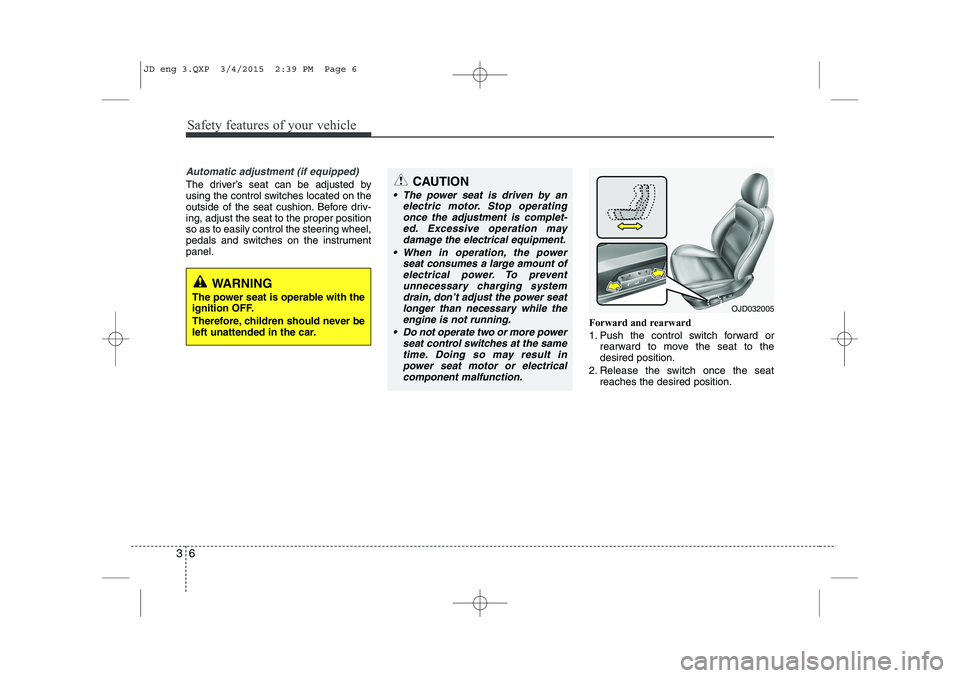
Safety features of your vehicle
6
3
Automatic adjustment (if equipped)
The driver’s seat can be adjusted by
using the control switches located on the
outside of the seat cushion. Before driv-ing, adjust the seat to the proper position
so as to easily control the steering wheel,
pedals and switches on the instrumentpanel.
Forward and rearward
1. Push the control switch forward orrearward to move the seat to the desired position.
2. Release the switch once the seat reaches the desired position.
WARNING
The power seat is operable with the
ignition OFF.
Therefore, children should never be
left unattended in the car.
CAUTION
The power seat is driven by an electric motor. Stop operating
once the adjustment is complet- ed. Excessive operation maydamage the electrical equipment.
When in operation, the power seat consumes a large amount ofelectrical power. To preventunnecessary charging system drain, don’t adjust the power seat
longer than necessary while the engine is not running.
Do not operate two or more power seat control switches at the same
time. Doing so may result inpower seat motor or electrical component malfunction.
OJD032005
JD eng 3.QXP 3/4/2015 2:39 PM Page 6
Page 23 of 1210
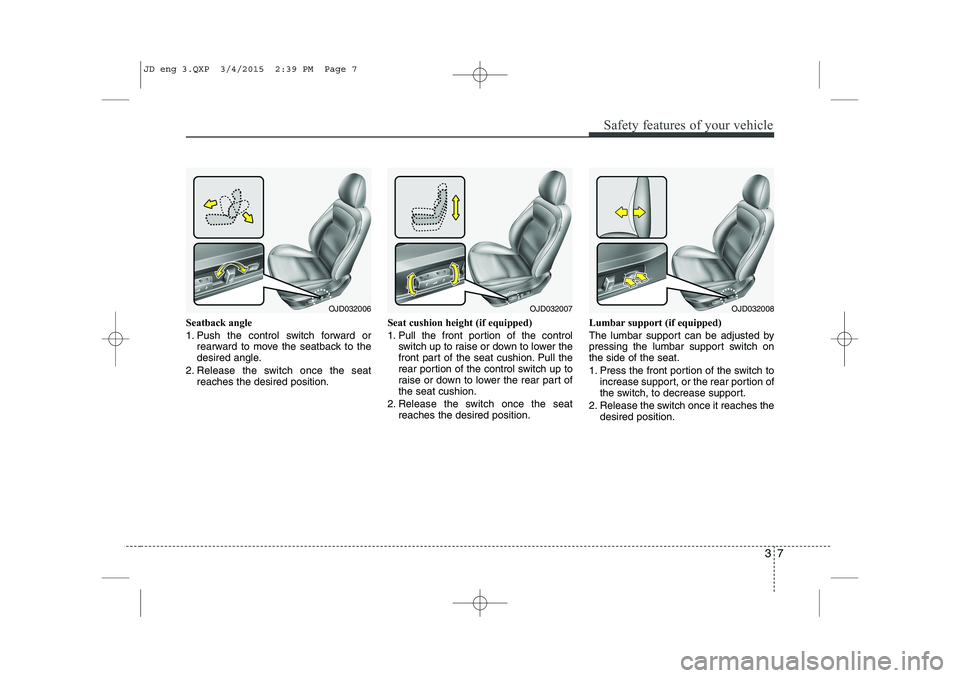
37
Safety features of your vehicle
Seatback angle
1. Push the control switch forward orrearward to move the seatback to the
desired angle.
2. Release the switch once the seat reaches the desired position. Seat cushion height (if equipped)
1. Pull the front portion of the control
switch up to raise or down to lower the
front part of the seat cushion. Pull the
rear portion of the control switch up to
raise or down to lower the rear part ofthe seat cushion.
2. Release the switch once the seat reaches the desired position. Lumbar support (if equipped)
The lumbar support can be adjusted by
pressing the lumbar support switch onthe side of the seat.
1. Press the front portion of the switch to
increase support, or the rear portion of
the switch, to decrease support.
2. Release the switch once it reaches the desired position.
OJD032006OJD032007OJD032008
JD eng 3.QXP 3/4/2015 2:39 PM Page 7
Page 24 of 1210
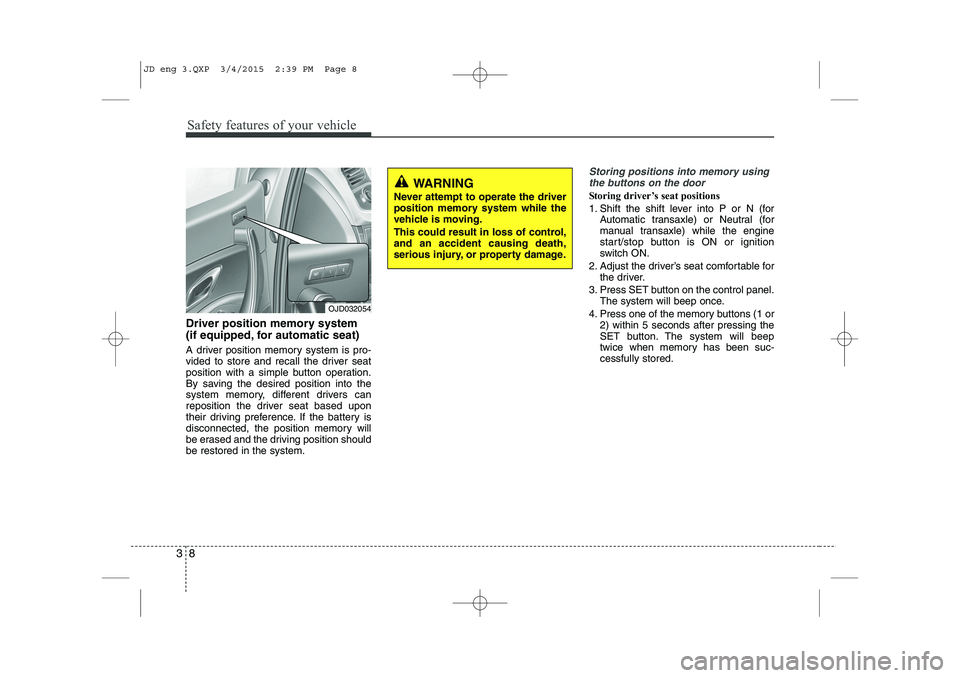
Safety features of your vehicle
8
3
Driver position memory system
(if equipped, for automatic seat)
A driver position memory system is pro-
vided to store and recall the driver seat
position with a simple button operation.
By saving the desired position into the
system memory, different drivers can
reposition the driver seat based upon
their driving preference. If the battery is
disconnected, the position memory will
be erased and the driving position shouldbe restored in the system.
Storing positions into memory using
the buttons on the door
Storing driver’s seat positions
1. Shift the shift lever into P or N (for Automatic transaxle) or Neutral (for
manual transaxle) while the engine
start/stop button is ON or ignition
switch ON.
2. Adjust the driver’s seat comfortable for the driver.
3. Press SET button on the control panel. The system will beep once.
4. Press one of the memory buttons (1 or 2) within 5 seconds after pressing the
SET button. The system will beep
twice when memory has been suc-cessfully stored.
WARNING
Never attempt to operate the driver
position memory system while the
vehicle is moving.
This could result in loss of control, and an accident causing death,
serious injury, or property damage.
OJD032054
JD eng 3.QXP 3/4/2015 2:39 PM Page 8
Page 25 of 1210

39
Safety features of your vehicle
Recalling positions from memory
1. Shift the shift lever into P or N (forAutomatic transaxle) or Neutral (for
manual transaxle) while the engine
start/stop button is ON or ignition
switch ON.
2. To recall the position in the memory, press the desired memory button (1 or
2). The system will beep once, then the
driver’s seat will automatically adjust tothe stored position.
Adjusting the control switch for the dri-
ver’s seat while the system is recalling
the stored position will cause the move-
ment to stop and move in the direction
that the control switch is moved.Easy access function (if equipped)
The system will move the driver's seat
automatically as follows:
Without smart key system - It will move the driver’s seat rearwardwhen the ignition key is removed and
front driver’s door is opened.
- It will move the driver’s seat forward when the ignition key is inserted.
With smart key system - It will move the driver’s seat rearwardwhen the engine start/stop button ischanged to the OFF position and front
driver’s door is opened.
- It will move the driver’s seat forward when the engine start/stop button is
changed to the ACC or START posi-tion.
You can activate or deactivate this feature.
Refer to "User settings" in section 4.
Headrest
The driver's and front passenger's seats
are equipped with a headrest for the
occupant's safety and comfort.
The headrest not only provides comfort
for the driver and front passenger, but
also helps protect the head and neck in
the event of a collision.
WARNING
Use caution when recalling the
adjustment memory while sitting in
the vehicle. Push the seat position
control switch to the desired posi-
tion immediately if the seat moves
too far in any direction.
OPA039052
JD eng 3.QXP 3/4/2015 2:39 PM Page 9
Page 26 of 1210
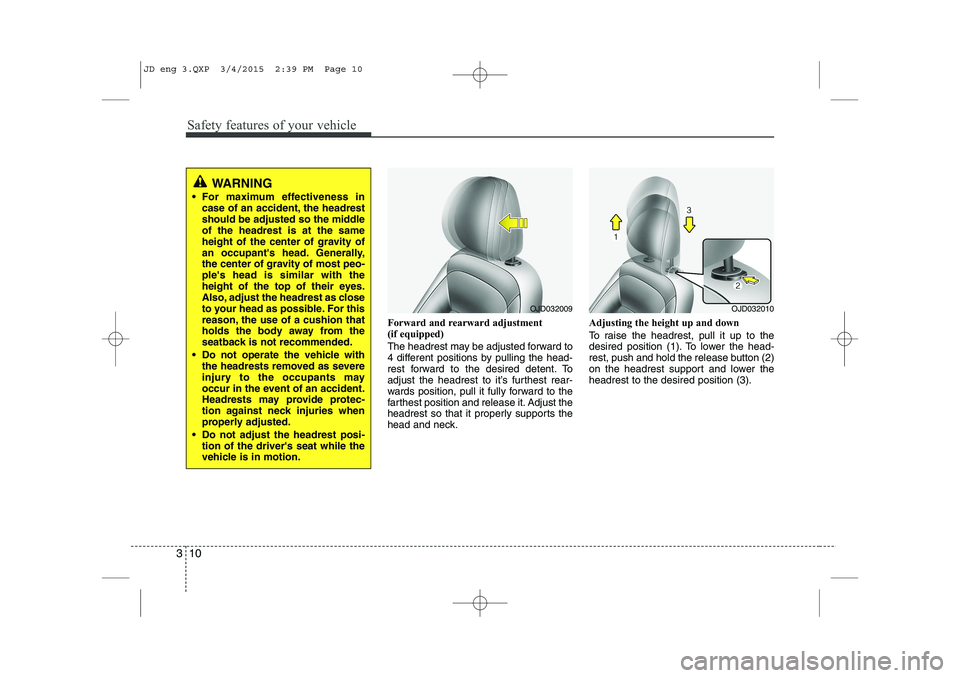
Safety features of your vehicle
10
3
Forward and rearward adjustment
(if equipped)
The headrest may be adjusted forward to
4 different positions by pulling the head-
rest forward to the desired detent. To
adjust the headrest to it’s furthest rear-
wards position, pull it fully forward to the
farthest position and release it. Adjust the
headrest so that it properly supports the
head and neck. Adjusting the height up and down
To raise the headrest, pull it up to the
desired position (1). To lower the head-
rest, push and hold the release button (2)
on the headrest support and lower theheadrest to the desired position (3).
WARNING
For maximum effectiveness in case of an accident, the headrest
should be adjusted so the middleof the headrest is at the same
height of the center of gravity of
an occupant's head. Generally,
the center of gravity of most peo-ple's head is similar with the
height of the top of their eyes.
Also, adjust the headrest as close
to your head as possible. For this
reason, the use of a cushion that
holds the body away from the
seatback is not recommended.
Do not operate the vehicle with the headrests removed as severe
injury to the occupants may
occur in the event of an accident.
Headrests may provide protec-
tion against neck injuries when
properly adjusted.
Do not adjust the headrest posi- tion of the driver's seat while the
vehicle is in motion.
OJD032009OJD032010
JD eng 3.QXP 3/4/2015 2:39 PM Page 10
Page 27 of 1210
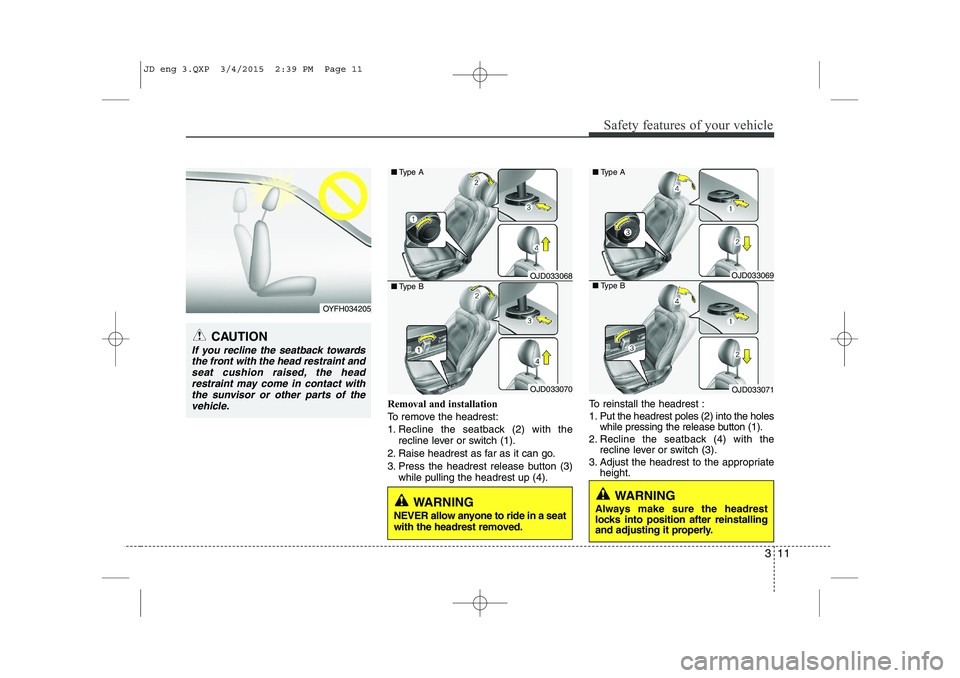
311
Safety features of your vehicle
Removal and installation
To remove the headrest:
1. Recline the seatback (2) with therecline lever or switch (1).
2. Raise headrest as far as it can go.
3. Press the headrest release button (3) while pulling the headrest up (4). To reinstall the headrest :
1. Put the headrest poles (2) into the holes
while pressing the release button (1).
2. Recline the seatback (4) with the recline lever or switch (3).
3. Adjust the headrest to the appropriate height.
WARNING
NEVER allow anyone to ride in a seat
with the headrest removed.WARNING
Always make sure the headrest
locks into position after reinstalling
and adjusting it properly.
OJD033069
OJD033071
■
Type A
■ Type B
OJD033068
OJD033070
■
Type A
■ Type B
OYFH034205
CAUTION
If you recline the seatback towards
the front with the head restraint andseat cushion raised, the head restraint may come in contact with
the sunvisor or other parts of thevehicle.
JD eng 3.QXP 3/4/2015 2:39 PM Page 11
Page 28 of 1210
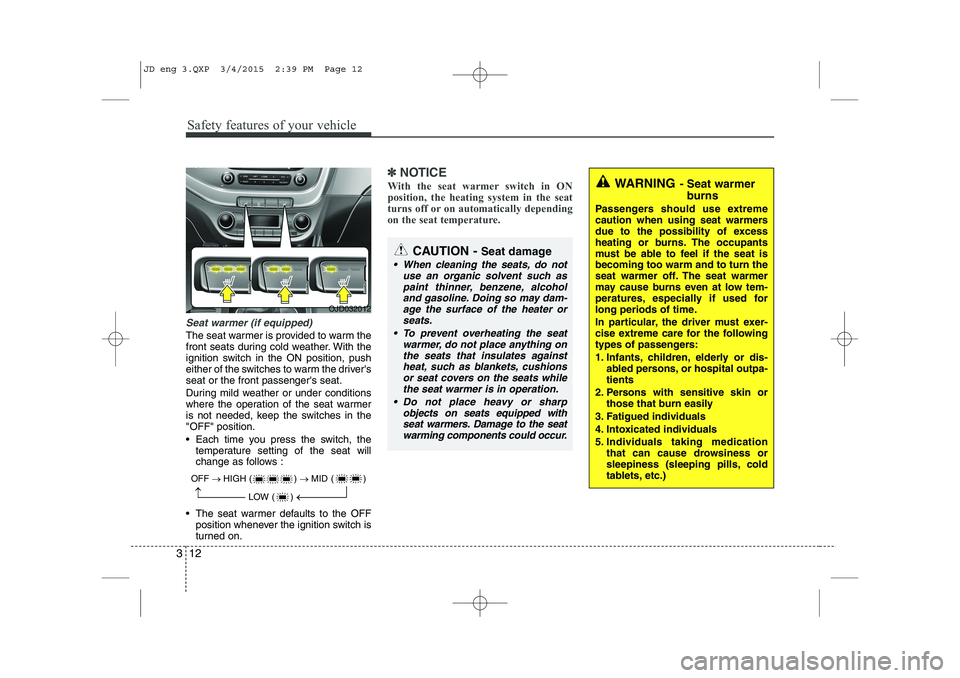
Safety features of your vehicle
12
3
Seat warmer (if equipped)
The seat warmer is provided to warm the
front seats during cold weather. With the
ignition switch in the ON position, push
either of the switches to warm the driver'sseat or the front passenger's seat.
During mild weather or under conditions
where the operation of the seat warmer
is not needed, keep the switches in the"OFF" position.
Each time you press the switch, the
temperature setting of the seat will
change as follows :
The seat warmer defaults to the OFF position whenever the ignition switch is
turned on.
✽✽ NOTICE
With the seat warmer switch in ON
position, the heating system in the seat
turns off or on automatically depending
on the seat temperature.
OJD032012
OFF � HIGH ( ) � MID ( )
LOW ( )
��
CAUTION - Seat damage
When cleaning the seats, do not
use an organic solvent such aspaint thinner, benzene, alcohol
and gasoline. Doing so may dam-age the surface of the heater or seats.
To prevent overheating the seat warmer, do not place anything on
the seats that insulates againstheat, such as blankets, cushions or seat covers on the seats while
the seat warmer is in operation.
Do not place heavy or sharp objects on seats equipped withseat warmers. Damage to the seat warming components could occur.
WARNING - Seat warmer
burns
Passengers should use extreme
caution when using seat warmers
due to the possibility of excess
heating or burns. The occupants
must be able to feel if the seat isbecoming too warm and to turn the
seat warmer off. The seat warmer
may cause burns even at low tem-
peratures, especially if used for
long periods of time.
In particular, the driver must exer-
cise extreme care for the following
types of passengers:
1. Infants, children, elderly or dis- abled persons, or hospital outpa- tients
2. Persons with sensitive skin or those that burn easily
3. Fatigued individuals
4. Intoxicated individuals
5. Individuals taking medication that can cause drowsiness or
sleepiness (sleeping pills, cold
tablets, etc.)
JD eng 3.QXP 3/4/2015 2:39 PM Page 12
Page 29 of 1210
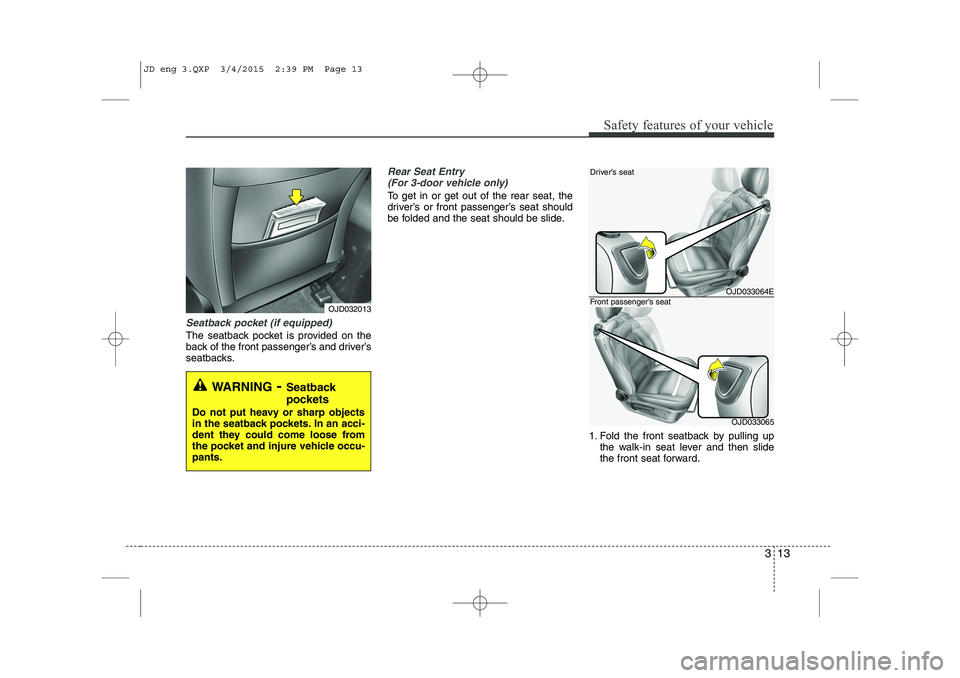
313
Safety features of your vehicle
Seatback pocket (if equipped)
The seatback pocket is provided on the
back of the front passenger’s and driver’s
seatbacks.
Rear Seat Entry (For 3-door vehicle only)
To get in or get out of the rear seat, the
driver’s or front passenger’s seat should
be folded and the seat should be slide.
1. Fold the front seatback by pulling upthe walk-in seat lever and then slide
the front seat forward.
OJD033064E
OJD033065
Driver’s seat
Front passenger’s seatOJD032013
WARNING
- Seatback
pockets
Do not put heavy or sharp objects
in the seatback pockets. In an acci-
dent they could come loose from
the pocket and injure vehicle occu-pants.
JD eng 3.QXP 3/4/2015 2:39 PM Page 13
Page 30 of 1210
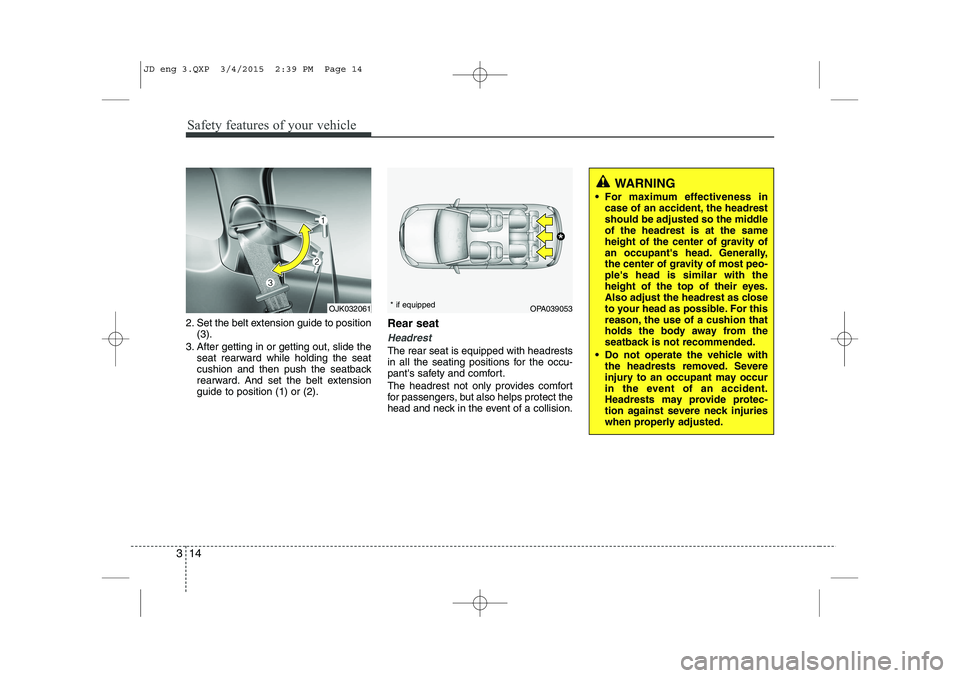
Safety features of your vehicle
14
3
2. Set the belt extension guide to position
(3).
3. After getting in or getting out, slide the seat rearward while holding the seat
cushion and then push the seatback
rearward. And set the belt extensionguide to position (1) or (2). Rear seat
Headrest
The rear seat is equipped with headrests
in all the seating positions for the occu-
pant's safety and comfort.
The headrest not only provides comfort
for passengers, but also helps protect the
head and neck in the event of a collision.
OPA039053
WARNING
For maximum effectiveness in case of an accident, the headrest
should be adjusted so the middleof the headrest is at the same
height of the center of gravity of
an occupant's head. Generally,
the center of gravity of most peo-ple's head is similar with the
height of the top of their eyes.
Also adjust the headrest as close
to your head as possible. For this
reason, the use of a cushion that
holds the body away from the
seatback is not recommended.
Do not operate the vehicle with the headrests removed. Severe
injury to an occupant may occur
in the event of an accident.
Headrests may provide protec-
tion against severe neck injuries
when properly adjusted.
*
* if equippedOJK032061
JD eng 3.QXP 3/4/2015 2:39 PM Page 14